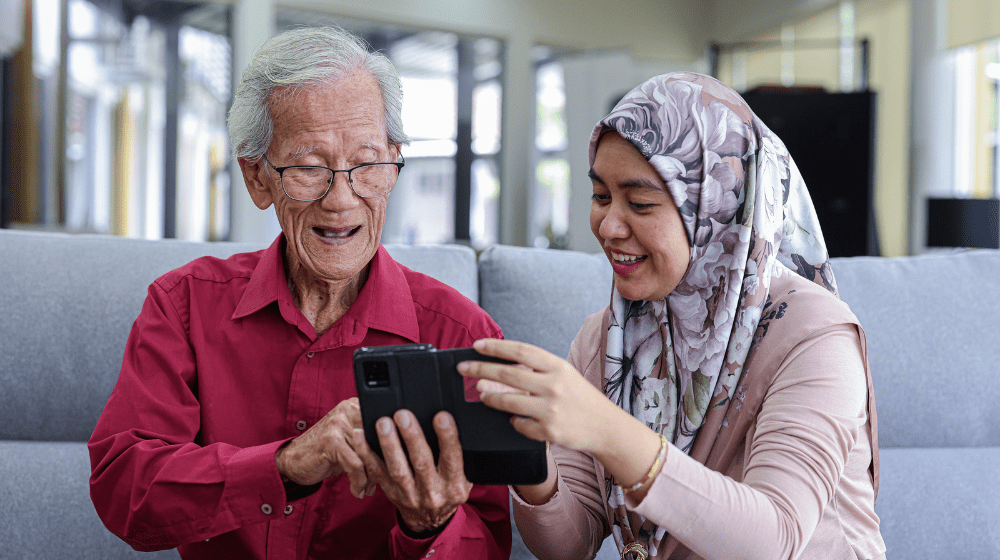On International Day of Older Persons, the Regional Director for UNFPA in Asia and Pacific, Mr. Pio Smith, highlights why it is important to invest in every stage of a person's life to ensure they age with dignity.
There is a saying that getting older isn't losing youth; it’s just a new phase full of chances and strength. This positive outlook is what the world needs most as we mark the International Day of Older Persons. We need to reimagine how we can empower older people to ensure they age with dignity and live fulfilling lives.
True - the world is undergoing a profound demographic transformation. By 2050, one in four people in the Asia-Pacific region will be over 60, with women representing the majority. For many older people, the prospect of ageing can be daunting. Concerns about financial security, declining health, and a loss of independence often lead to a fear of becoming marginalized or a burden to others. In the Asia-Pacific region, where 670 million people - one in seven of us - are over 60, we face a pivotal question about how to build care systems that safeguard their well-being.
What is false, however, is the view that ageing is a problem. We should embrace ageing as an opportunity. Older people carry a wealth of knowledge, skills, and experience that can greatly benefit their families, communities and economies. The rise in life expectancy across the region speaks to the remarkable progress in healthcare and poverty reduction. Yet, older persons face ongoing challenges exacerbated by climate change, conflict, and social exclusion.
Older people carry a wealth of knowledge, skills, and experience that can greatly benefit their families, communities and economies.
Take Mei, a 75-year-old woman living in a rural village in Southeast Asia. After a lifetime of hard work as a farmer, her declining health and limited resources have made it difficult for her to sustain her livelihood. Her children have moved to the city for better opportunities, leaving Mei to navigate her future alone. While she benefits from the government’s health insurance for older people, she remains uncertain about her financial security, access to healthcare and social isolation.
Stories like Mei’s are becoming increasingly common as traditional family structures shift and the cost of living rises. Governments in the region are now grappling with the growing demand for policies and programmes that support older individuals, especially women, who face compounding vulnerabilities in old age.
To address these challenges, we need a new approach to care systems that goes beyond healthcare to encompass social support, protection from abuse, and opportunities for older people to stay active and engaged in society. This requires policies that are not only inclusive and responsive but also rights-based and gender-sensitive.
UNFPA, the United Nations sexual and reproductive health agency, embraces a life-cycle approach to ageing. We believe that investing in every stage of life—from childhood to adulthood and old age—is key to fostering resilience and well-being. We need to protect women and girls, including the elderly, from gender-based violence, such as elder abuse, and ensure their access to essential health services throughout their lives.
Governments must invest in forward-looking policies that prioritize the needs of people at all stages of life. These policies must ensure older individuals can age with dignity, while also promoting their active participation in society. The "silver economy," which capitalizes on the economic potential of an ageing population, has the potential to boost GDP by up to 2.8 percent in some countries in the region.
Let’s celebrate ageing and reinforce it as a force for good in all our societies.
However, we can only realize this vision by strengthening care systems throughout the region. We need to enhance healthcare infrastructure, invest in the training of healthcare professionals, and expand access to vital social services. Fostering intergenerational relationships can also promote mutual respect and understanding between older and younger generations, helping to reduce social isolation.
At UNFPA, we are dedicated to working with governments, civil society organizations, and other partners to build inclusive, equitable care systems that uphold the rights of older persons. As our world ages, society must also adapt. We have the opportunity and responsibility to create a future where ageing is embraced, and everyone, regardless of their age, can live with dignity and respect. On this International Day of Older Persons, let's stay focused on the silver lining - let’s celebrate ageing and reinforce it as a force for good in all our societies.
Learn more


